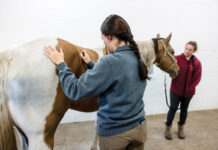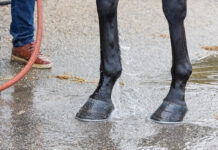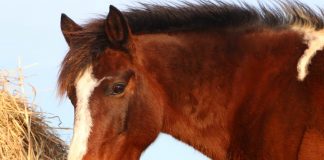Q:
My mare is now 30 years old, and I’m starting to worry about her health,
especially going into winter. Everyone tells me that I’ll know when “her time”
is getting close, but HOW will I know? Is there anything I should look out for?
I don’t want her to suffer.

Making the decision when to euthanize an
animal can sometimes be one of the hardest decisions an owner has to make. A deeply personal and emotional choice, the
question of “how do I know when it’s time” will vary on a case-by-case basis,
but here are a few guidelines.
Considering
the animal’s quality of life is usually the most helpful aspect to
evaluate. Focusing on this will help
keep the animal’s best interests at heart.
First of all, don’t evaluate your horse simply based on age. In fact, forget her age altogether. Consider instead the health of her body and
her ability to maintain a decent lifestyle.
Is she losing weight despite regular dental checks and a high quality
diet tailored to senior horses? Is she
on any medications? If so, what are they
and are they helping? Does she suffer
from arthritis and if so, how badly?
Does she suffer from chronic ailments that are slowly deteriorating her
body? Are you afraid she is going to
fall or be a danger to herself, other horses, or you? Answering each of these questions objectively
will help you formulate a picture of your mare’s health and her ability to
carry on comfortably.
Some
advice that small animal veterinarians give dog owners is to ask themselves:
can the dog still do what the dog has always loved to do? If not, then quality of life for the dog is
reduced and it may be time to say goodbye.
Horses are different in that they don’t love to play fetch or bark at
the mailman, but if your mare has been slowly losing interest in her favorite
treats, or doesn’t nicker for her dinner anymore, these may be signs that her
quality of life is diminishing.
In
contrast, be sure to balance these aspects with what is normal for an older horse: losing her place in the pecking order
of the herd, eating more slowly and quidding (dropping feed), moving slower and
being stiff – getting old is no fun!
Occasionally, horse owners become obsessed with the subtleties of the
older equine and fret over minutia.
Communicate with your veterinarian and express your concerns. Older animals need physicals just as young
animals do, but a geriatric exam focuses on different physical attributes. No longer are we judging the horse’s physical
fitness or subtle lamenesses that may hamper an athletic career, but rather
evaluating for cardiac insufficiency, tumors, worn molars, and ophthalmic
changes, to name a few.
Another
aspect to consider when trying to make this tough decision is planning
ahead. If your mare had a rough winter
last year and you’re worried about her making it through this next one,
sometimes it is better to make a euthanasia decision while the animal is still
somewhat comfortable and the weather is decent.
The worst time to have to make a euthanasia call is during a stressful
situation when the animal is in dire straits and the owners are upset. Sometimes planning ahead for the inevitable
makes the process as peaceful and as gentle as it can be. But again this is a balance: obviously you
don’t want to make the decision too soon, but I’d strongly advice against
waiting until the very last moment, when the horse has already greatly
suffered. Euthanasia means “good death”,
if there can be such a thing, so I believe the goal is simply to minimize animal
suffering.
Many
people feel unprepared to make such a euthanasia decision, or that it’s not
theirs to make, but being the caretaker of an animal places this responsibility
on your shoulders. Hopefully this
discussion has given you things to think about to help make your decision.
A
strong support system is also important.
Surround yourself with people who care about you and your mare and they
will make coping with your decision easier.
With them you can celebrate your mare’s wonderfully long life instead of
dwelling on her death. Some veterinary
schools also offer pet loss support hotlines and these are included below. Good luck with your decision.
Pet
Loss Support Hotlines:
Cornell
University: 607-253-3932
University
of Illinois: 877-394-CARE (2273)
Tufts
University: 508-839-7966
Washington
State University: 866-266-8635
Further Reading
End-of-life options for equines
Humane options for horses
Anna O’Brien, DVM, is a large animal veterinarian in Maryland and a frequent contributor to Horse Illustrated magazine and horseillustrated.com. Follow her on Twitter: @annaobriendvm







My mare turned 38, still likes to play, just a lot more slowly. Now retired, her favorite thing to do is eat! Hips are good, appetite is more than good but one day, if she doesn’t decide to pass on her own, I too, may have a decision to make. Got her when she was 10 and we’ve had a ball over the years. She’s a tough old Arabian Cooky!!! Every morning we look out at the coral to make sure she’s standing at the gate, ready for breakfast. Know one day she won’t call out for it but we are prepared for it. Her life made mine much more bearable, so many times. Won’t let her suffer.
Oh, man. I definitely feel for you. I am afraid that time may be coming for us to consider the options as well.
My 20 yr old gelding foundered on the springtime grass several years ago and was in obvious agony. Putting him down was by far one of my life’s worst moments. But I knew then, and still know now, that it was the right and best thing for him. It’s a hard hard decision, but one of the best you’ll make, too… it’s just so heart-wrenching
good ifo